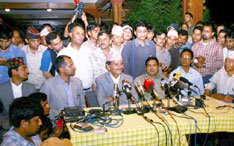Members of the government and Maoist negotiation teams have agreed to a 25-point code of conduct late Friday to be observed by both the sides during the period of ceasefire.The talks ended at 10:15 p.m. after more than six hours of closed-door negotiations between the two parties at Gokarna Forest Golf Resort in Kathmandu.

The code of conduct, jointly signed by Home Minister and leader of the government negotiation team Krishna P Sitaula and coordinator of the Maoist negotiation team Krishna Bahadur Mahara, says both the parties would cease all types of military activities during the period of ceasefire.
They have also agreed not to call 'bandh' or transport strike throughout ceasefire. The code of conduct, however, says rallies and meetings could be organized peacefully. Similarly, both the sides have agreed not to create any obstructions in the movement of medicines, food, construction materials meant for development programmes and goods for daily consumption.
The code of conduct says that no donations would be collected, whether cash or kind, through coercion.
Both the sides have agreed to make public whereabouts of "disappeared people," help displaced people to return to their villages and release the detainees gradually. Similarly, both the government and CPN (Maoist) have agreed to involve national and international team in the monitoring of ceasefire "on the basis of mutual consensus." The agreement, however, doesn't specifically mention whether the international monitor would be the United Nations or any other international agency.
The government and the Maoists also agreed on ending the forceful collection of donations and financial assistance.
The code of conduct, which has come into force from Friday, may be amended on the basis of mutual consensus, both the parties said.
Talking to reporters briefly after the first round of formal talks, Maoist leader Mahara said things this time were drastically different this time. He said he hoped that his party might not have to return to war this time. "We had gone to the war a decade ago out of compulsion," he added.
"We don't want to return to war again," said Mahara after the meeting.
He added, "This (talks) is the first step towards achieving our goal of a constituent assembly election."
Similarly, Home Minister Sitaula said that the dialogue was held in a constructive environment."Now no Nepali will have to spill blood to for the reasons of an armed conflict," said Sitaula.Home Minister Sitaula expressed hope that a durable solution would be found through peace talks to the decade-old armed conflict.
Both sides also agreed to hold another round of talks after reaching the agreement today.However, no date has been set for the next round of talks.
No comments:
Post a Comment